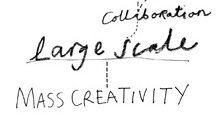 Charles Leadbeater si è occupato a lungo di Internet e del suo impatto culturale scrivendo saggi come Living on Thin Air e The Pro Am Revolution (quest’ultimo con Paul Miller). Da qualche mese sono online (ancora in versione provvisoria, diventeranno libro l’estate prossima per Profile) i diversi capitoli del suo ultimo lavoro, We-Think: the power of mass creativity.
Charles Leadbeater si è occupato a lungo di Internet e del suo impatto culturale scrivendo saggi come Living on Thin Air e The Pro Am Revolution (quest’ultimo con Paul Miller). Da qualche mese sono online (ancora in versione provvisoria, diventeranno libro l’estate prossima per Profile) i diversi capitoli del suo ultimo lavoro, We-Think: the power of mass creativity.
Si tratta del risultato di un paio di anni di analisi sulla crescita degli approcci partecipativi all’innovazione da parte degli ambiti scientifici, del software libero, delle comunità di videogiocatori e delle aggregazioni politiche. E l’obiettivo perseguito con la pubblicazione delle bozze del libro è stato quello di stimolare gli utenti a fornire opinioni, spunti e dati su cui lavorare senza che, si legge sul sito, questo processo venga arrestato dall’uscita in libreria. Sul lavoro di Leadbeater sono usciti in ottobre anche un paio di articoli che lo presentano, Are you thinking what I’m thinking? sul Time Online e Welcome to We-Think su Comment is Free in cui si dice:
They [new culture of mass participation and innovation] could change not just media, software and entertainment but also the way we organise education, health care, cities and indeed the political system. That is because the world of We-Think poses fundamental challenges to traditional, hierarchical organisations operate. Business gurus encourage us to think of organisations as mechanical value chains: neat, linear, controlled. But try and draw a picture of Wikipedia as an organisation: it resembles a collective birds nest, made up of thousands of small bits of information, each carefully put in place.
E ancora:
The guiding ethos of this new culture is participation. The point of the industrial-era economy was mass production for mass consumption — the formula created by Henry Ford. We were workers by day and consumers in the evenings or at weekends. In the world of We-Think the point is to be a player in the action, a voice in the conversation — not to consume but to participate.
Per We-Think è stato attivato anche il We Think Blog in cui vengono spiegati specifici dettagli del libro, anche se gli aggiornamenti si fermano alla fine dello scorso novembre. In Italia qualcosa del genere lo ha fatto Luca De Biase con Economia, crescita, felicità e blog.